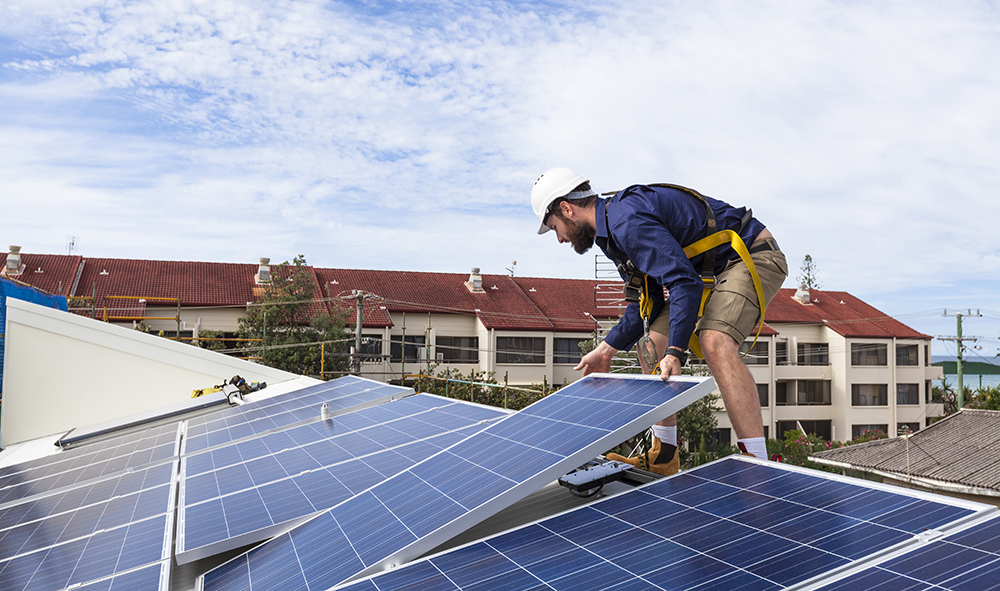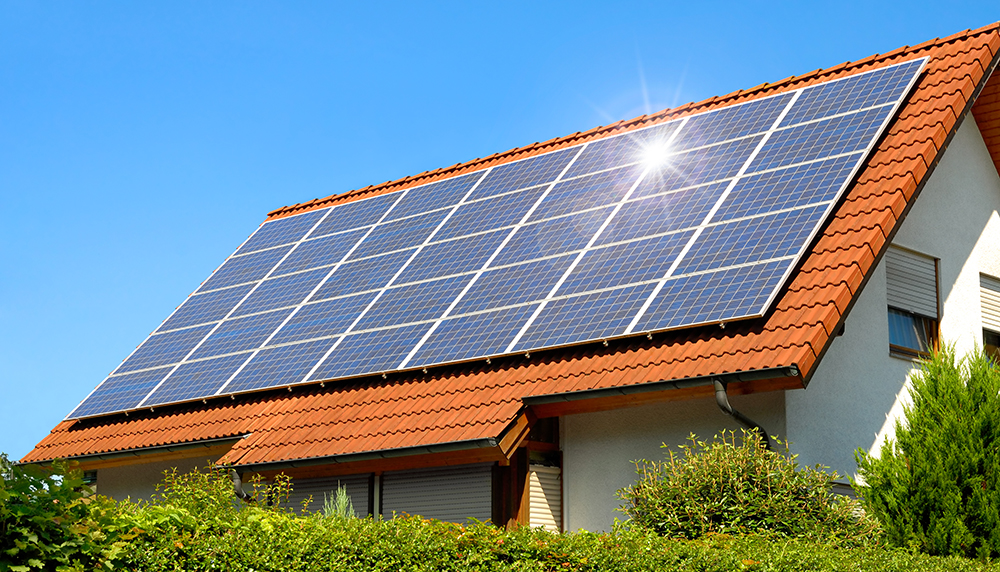Installing Solar Panels: Is It Bad for Your Roof?

If you are considering putting solar panels on your roof, a natural question to ask is; ‘Do solar panels damage roof?’ You may be surprised to learn that a good solar panel installation does not damage your roof. In fact, if experienced solar companies do the installation process, your rooftop solar panels can increase the lifespan of any type of roof.
Does Solar Panels Damage My Roof?
No, solar panels do not damage your roof. Although a bit of drilling is necessary to place the solar panels onto the roof, your solar panels installed help avoid roof damage caused by the elements: the rain, the snow, the wind. Furthermore, your solar panel installation shields your roof from the sun’s bleaching rays so that the color of your roofing material will last for a longer time. It is likelier that your panels will get damaged than the roof itself.
How Long Does a Roof Last?
Depending on your climate, the weather conditions, and the material your roof is made of, the new roof can last anywhere between 15-60 years. Any roofing company will tell you that these are estimates and that the actual lifespan depends on a number of factors. As the material your roof is made from is the most important to consider before adding solar panels, here is a breakdown of expected times before you should have your roof replaced:
- Asphalt shingles: 15 – 35 years,
- Composite shingles : 20 – 50 years,
- Clay tiles: ~ 50 years,
- Concrete tiles: ~ 50 years,
- Metal roofs: 50+ years.
Do Solar Panels Make Your Roof Last Longer?
Yes, your solar panels can make your roof last longer. If you have an experienced contractor mounting solar panels on your rooftop, the installation process should not damage your roof. In fact, it can help protect it from the elements, excessive humidity, and the air movement between the solar panels and your roof will ensure your roof is dry just hours after rain and that your house is kept cooler, as the sun’s rays cannot reach the roof and heat it as strongly as before.
Preparing Your Roof for Solar Panels
Even before solar panels are installed, you should do a roof inspection to make sure that the roof can support the extra weight. Furthermore, any pooling water, cracks, or damaged shingles need to be taken care of before installing solar panels. Your solar panel installation is not too heavy, but the additional weight demands good support – solar panels add approximately 3 lbs of weight per square foot of your roof.
Things You Should Know Before Buying Solar Panels
Your solar panel installation can help save money and bring down that electric bill to almost zero. However, to reap all the benefits your solar installation and solar power can bring to you, you should consider several factors first. These factors determine whether you are able to go solar or not.
Condition of the Roof
Your roof should be inspected by professionals before solar panels installed can put extra weight on it. The bearing capacity of any cracks and damage can significantly reduce the lifespan of your roof. Furthermore, if the roof is not in the appropriate shape, the installation process can be dangerous, even if done by professional solar installers.
Roofing Material and Slope
The roofing material and slope are other factors to consider before going solar. The material of your roof determines its lifespan. If your roof needs to be replaced soon, it is best to do it before your solar installation is put into place. If you decide to replace your roof once solar panel installers have finished their job, you will pay the extra expense of taking the solar panels down and reinstalling them.
Weight
As a solar array adds only about 3 pounds of weight per square foot of your roof, most roofs are able to support the weight of your solar panel system without extra support. However, in some older houses, the roof may be damaged to the point that it cannot support the extra weight. If this is the case with your home as well, do roof repairs or replacement first, and then contact a solar company and ensure your panels are properly installed.
Weather
The weather plays an important role in solar panel installation. Solar panels protect your home from excess heat and moisture, but strong winds and a lot of snowfall every winter can increase the chances that panels damage your roof. Always place solar panels on the roof when you are sure there can be no damage done.
Warranty
The roof warranty and solar panel warranty are other factors to consider. Roof warranty may be voided if the panels damage your roof due to an inexperienced solar installer doing the installation. Roof warranties, in general, cover the cases of solar panel installation for as long as the holes drilled for solar mounting do not interfere with the structural integrity of the roof. Always check with the roofing manufacturer before drilling holes, especially in an older roof.
Permits
Your local permits are important. Even a proper installation of a ballasted racking system and solar panels demands local and building permits to be obtained. This is to ensure that your panels are installed properly and to protect your and your neighbors’ safety.
Common Roofing Types for Solar Panels

No two roofs are the same. Sloped or flat roofs can also be different by the type of material that they are made from. Knowing the material of the roof beforehand and how to approach solar panels and roof as one will help you protect your roof as well as avoid structural damage due to the added weight. Most homeowners can have solar panels installed without additional support, but in some cases, this may be needed. Read on for more on common roofing types for solar panels.
Asphalt and Composite Shingles
Asphalt and composite shingles are among the most common roof types. Asphalt roofs are expected to last between 15 and 35 years. Composite shingles, on the other hand, can last between 20-50 years. If your roof is coming to the end of its lifespan, consider replacing it to avoid structural damage due to panel installation.
Metal Roofs
Metal roofs can usually be seen on high rise and some low residential buildings. Installing lag bolts to support the panels is relatively easy, and these roofs can easily withstand severe weather. Metal roofs, in general, last longer than 50 years.
Tiles
There are two types of tiles used for roof laying: clay and concrete tiles. They both have a lifespan of over 50 years. However, due to their own weight, which is an important factor in determining the bearing capacity and avoiding a damaged roof, it is best to hire a professional with proper training. They will know how to install the panels easily and prevent damage, such as water leaks and voiding your roof’s warranty.
Do Solar Panels Void Roof Warranty?
If placed by a professional with proper training, your solar panel will not void the roof warranty. It is important to estimate the bearing capacity of the roof itself beforehand. Depending on how much weight your roof can carry, you may not be able to install panels and protect your roof at the same time. Mostly, this is not the case.
Potential Problems with Solar Panels
There are several potential problems with solar panels. While they are considered a safe technology, considering that they are bolted into your house and can create a strong current, it is important to have a professional install them. Here are some potential problems with solar panels:
- Water leaks;
- Damage to the structure of the roof;
- Damaged shingles – danger from rodents and insects; and
- Fire in case of improper wiring.
Proper Removal of Solar Panels
When removing solar panels for roof replacement or reparation, you should ensure that specific safety steps are undertaken. You should undertake these steps to avoid damage to the roof. Furthermore, improper handling by inexperienced solar companies can damage your rooftop solar panels and any other equipment, such as your solar batteries, solar inverter, or solar charge controller.
Steps to undertake when you have your solar panels removed:
- Disconnect the solar panels from the home power system and the grid.
- Disconnect solar panels from the inverter.
- Remove panels from the mounting.
- Remove the wiring.
- Remove the mounting.
- Repair any roof damage and plug the drill holes.
Roof Replacement
If you are considering installing solar panels, you should inspect your roof before you install solar panels. This way, you can ensure that your roof can support the weight of your solar panel installation and that your solar panels will not need to be removed in the future for roof reparation. Once solar panels are installed, they are best left in place until the end of their lifespan.
If roof inspection shows that the roof or the bearing are damaged and should be replaced, contact a good roofing company to do the job for you. Specify that you plan on installing solar panels, and ask for a roof warranty and the details of it. Yoru roofing company may be able to suggest solar companies that can install solar panels in a way that does not damage your new roof warranty.
FAQs
Can birds damage solar panels?
If your solar panels are installed properly, birds can do little to no damage. In most cases, bird droppings can cause partial shading of the panels. Sometimes, birds nesting under the panels can cause rodents and insects to move in as well. Keeping your panels clean is essential.
Will solar panels increase my insurance?
In most cases, solar panels will not increase your insurance. Most insurance policies cover solar panels as well. To ensure you have the right level of protection, contact the insurance agent and inquire about the specifics of your insurance policy.
Do solar panels cool your attic?
Yes, solar panels can cool your attic. Solar panels provide protection for the roof by shading it. This means that during summer, your roof will not get as hot, and in turn, your attic will be much cooler. Your solar panel installation effectively acts as yet another layer of insulation for your home during summer.
What is the dead load of solar panels?
The dead load of solar panels is around 3 lbs per square foot. This is not too much for your roof, as most roofs can take around 20 lbs per square foot of live load. Still, panels should be installed by a professional, and your roof load-bearing capacity has to be assessed as the panels’ dead load is not uniform but rather dotted.
Conclusion
If you are thinking about going solar, you may be concerned about solar panels and your roof structural integrity. As with most other housework, safety should always be number one, so follow our safety tips to learn how to protect your roof and ensure many years of solar power for your household. In most cases, with US roofing, there is no need for concern, as a good installation prevents damage to the roof, prevents leakage, and protects your solar investment.
Updated on
